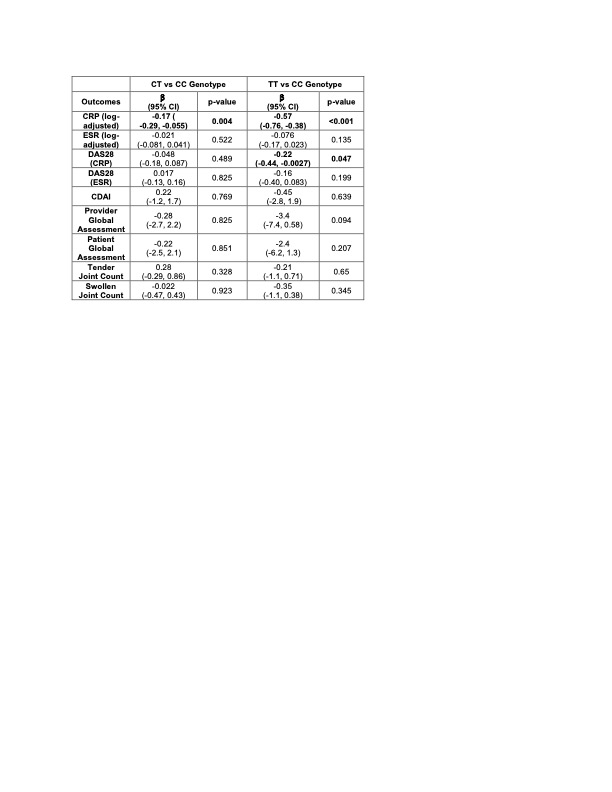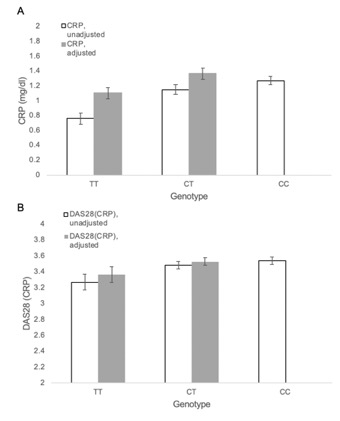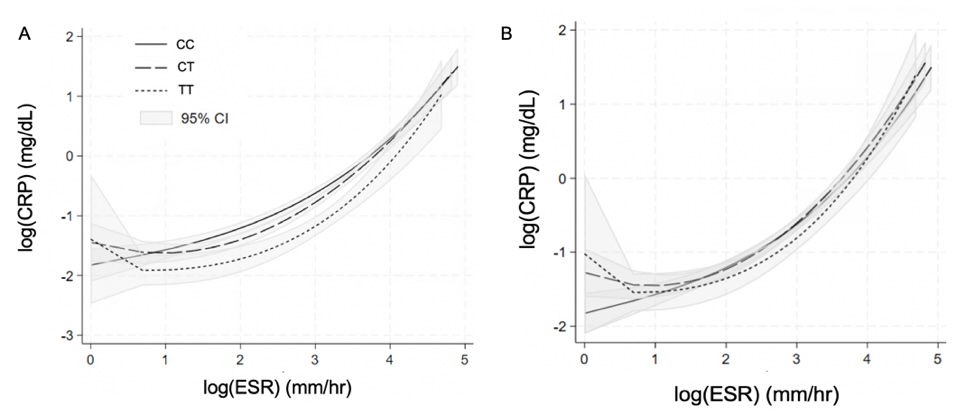Session Information
Session Type: Poster Session B
Session Time: 10:30AM-12:30PM
Background/Purpose: C-reactive protein (CRP) is often used as a biomarker for disease activity in patients with rheumatoid arthritis (RA). We evaluated whether rs1205, a common genetic variant in CRP previously associated with lower CRP, impacts disease activity assessment in patients with RA, including the disease activity score-28 with CRP (DAS28(CRP)). We hypothesized that patients with this variant would have lower CRP and DAS28(CRP).
Methods: Participants from 3 observational cohorts were evaluated: the United Kingdom Biobank (UKB), the Veterans Affairs RA registry (VARA), and the FORWARD Databank RA cohort. All participants from UKB were included, regardless of a diagnosis of RA; a subgroup of participants with ≥1 ICD-10 code for RA (ICD-10 M06.9*) was identified. Participants were directly genotyped for rs1205. Population structure was estimated using principal component analysis. The effect of rs1205 genotype (CC, CT, or TT) on log-adjusted serum CRP and disease activity metrics were assessed using linear regression adjusted for sex, age, and 6 principal components of population structure in each cohort. Regression coefficients from UKB were used to create a corrected CRP and DAS28(CRP) within FORWARD and VARA. Finally, reclassification to an abnormal CRP ( >0.8 mg/dl) and between DAS28(CRP) disease activity states were determined.
Results: Among 488,377 participants from UKB, 214,153 (44.0%) were heterozygous and 52,055 (10.7%) were homozygous for rs1205 T. Those in UKB with the TT and CT genotype had a lower log-adjusted CRP compared to the CC genotype [Β TT genotype: -0.371 (95% CI -0.381, -0.360), p< 0.001; Β CT genotype: -0.173 (95% CI -0.179, -0.167), p< 0.001]; this was similar in participants with an ICD-10 code for RA.In 2597 VARA participants, 1107 were heterozygous (42.6%) and 269 (10.4%) were homozygous for the rs1205 T allele. Those with the TT and CT genotypes had a significantly lower log-adjusted CRP compared to the CC genotype (Table 1). The DAS28(CRP) was significantly lower in the TT genotype compared to the CC genotype [Β -0.22, (95% CI -0.44, -0.0027), p = 0.047)], but not in the CT genotype. There were no significant differences for other disease activity components or composite scores (Table 1).Among 766 participants from FORWARD, 352 were heterozygous (46.0%) and 82 were homozygous for rs1205 T (10.7%). Individuals with TT had a lower log-adjusted CRP compared to the CC genotype (but not CT); there were no observed differences by genotype in Patient Activity Score-II or patient global assessment.Application of a correction factor derived from UKB was applied in VARA (Fig. 1, Fig. 2). In VARA participants with the TT genotype, 8% were reclassified to an abnormal CRP ( >0.8 mg/dl) and 3% were reclassified from low disease activity to moderate disease activity. With this adjustment in FORWARD, 11 (3.6%) with the CT genotype and 4 (5.9%) with the TT genotype were reclassified as having an elevated CRP.
Conclusion: The rs1205 CT and TT genotype in CRP is associated with lower CRP; the TT genotype is associated with lower DAS28(CRP), but not other components of disease activity. A modified CRP and DAS28(CRP), corrected for genotype, has modest effects on disease activity interpretation and reclassification.
To cite this abstract in AMA style:
Riley T, Wheeler A, Cannon g, brian S, Kunkel G, Wysham K, England B, Wipfler K, Michaud K, Wallace B, Elam R, Monach P, Reimold A, Kerr G, Smith I, Richards J, Lee I, March M, Damrauer S, Verma A, George M, Mikuls T, Baker J. Genetically-determined Variation in C-reactive Protein Impacts Disease Activity Assessment in Rheumatoid Arthritis [abstract]. Arthritis Rheumatol. 2024; 76 (suppl 9). https://acrabstracts.org/abstract/genetically-determined-variation-in-c-reactive-protein-impacts-disease-activity-assessment-in-rheumatoid-arthritis/. Accessed .« Back to ACR Convergence 2024
ACR Meeting Abstracts - https://acrabstracts.org/abstract/genetically-determined-variation-in-c-reactive-protein-impacts-disease-activity-assessment-in-rheumatoid-arthritis/



